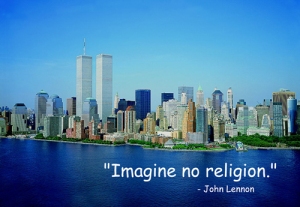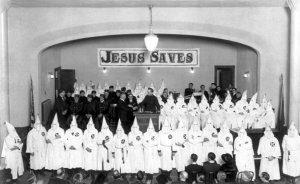“”It’s rare to walk anywhere in public and not see some religious advertisement every few moments. Imagine if the cause of non-belief were promoted to even one hundredth this degree? Theists would be totally outraged. Yet if an atheist decides to react to the overwhelming pro-religion propaganda that’s in his face on a daily basis, he’s labeled as “militant”, “intolerant” and “extremist.”
—Morgan Matthew, Why atheists care about religion
—Morgan Matthew, Why atheists care about religion
Part of the human psyche is tribalism: an unwavering loyalty to one’s in-group. Tribes served to protect families from other tribes that wanted the same resources. These tribes were formed from several extended families which would evolve over time. From these loose tribal relations arose permanent settlements and cities. As individual tribes arose to power they were able to subjugate other tribes creating kingdoms and even empires. With the formation of nations, a tribe became self-sovereign with respect to other tribes. Yet as the borders of these kingdoms, empires and nations grew, so did the tribes become split between ideologies, religion, even sports teams. Our schools are infused with it, even the social construct of race is based on tribalism.
Another equally powerful aspect of the human psyche is the need to explain the world around them; a species-wide compulsion really. This compulsion is met by two abilities that are also definitive of humanity: imagination and reason. Reason is basically our ability do deconstruct the world around us to see how it works. Imagination is our ability to construct things not found in nature.
Ancient man used myth to explain natural phenomenon. The basis for these myths was a stout dose of imagination tempered only by the very human experiences of their creators. Out of these myths, religion was born. Once reason was applied to imagination philosophy was born. Once the collective ego was removed from philosophy, only the natural world remained and the study of it with awe and imagination tempered only by reason is science.
Science has dispelled nearly all of the myths of ancient man. However, religion still remains.If not in the 21st century, then surely the 22nd century will see the end of religious tribalism in developed countries. This trend has nearly happened in most of Europe and is beginning to take hold in the U.S. While the Mid-East is seeing a resurgence of fanatical, militant religiosity it looks more like the death throes of extremist theocrats. Once more moderate Muslims temper the extremists in their midst, even Islam will wane.
Once religion has disappeared, or at least marginalized, then what? The tribalistic nature would still remain. The what? Statist tribalism? Cults of personality? It doesn’t work. Be it Mohamed, Hitler, Reagan, Pol Pot, Mao, Moses, Stalin, Karesh, or Paul the application of religious-like (as in faith-based) obedience to a leader nearly always ends in bloodshed. The few exceptions are mainly Gandhi, Siddhartha Gautama (the Buddha) and Martin Luther King Jr. (who based his work of passive resistance on Gandhi). What religion (or ideology) those listed above follows is mostly irrelevant rather it is the mechanism of religion that gives these people their power. That mechanism in faith.
Faith is obedience without evidence. Faith in a person beans one follows that person without evidence that their ideals are just. Faith in an idea is blind acceptance. It is faith that is the destructive force behind religion, and the very thing that allows bronze age myths to be taken as true by modern man.
But to quell religion should it be outlawed? Absolutely not! Outlawing religion would only harden and embolden its fanatics, while increasing their number. But that is not the real reason. In any society, secular or theistic, crime is stigmatized. It would be very un-humanist to stigmatize someone who is harmlessly mistaken in a belief. However, an organization is not a person. To stigmatize a church is no different than stigmatizing the Ku Klux Klan. Both groups exist to spread tribalistic ideology aimed at controlling others.
Instead, the humanist approach is not to legislate away bad ideas like religion, racism, and chute-less skydiving, but to debate it away; to demonstrate the absurdity and immorality of it. How is this done? Through education, but never indoctrination. What then is the difference? In education the facts lead the conclusion and all conclusions have merit only as long as the facts support them. In indoctrination the position is mandated by those in power. To outlaw religion means to fine, jail, even execute the practitioners. Thus to outlaw religion is the most violent form of indoctrination.
The need to be a part of something larger than oneself still remains after the gods die. So then what do we replace our petty tribes with?
US.
ALL OF US.
Hold to humanity itself. That which fosters our species is good, and that which hinders it is bad. But what actions should we take? Our collective endeavors, be they political, economic, or social should be to relieve suffering (compassion), advance understanding (knowledge), minimize forced tribalism (liberty) and advance voluntary cohesive cooperation (community).
It is time for the human species to quit living on its knees and stand. Stand up to the oppression of religion by battling the very idea of faith. But the battle of the humanist is not fought with guns and bombs, and these must never be wielded in the name of humanism. Our weapons are knowledge, logic and love. Our love for knowledge, logic and humanity are all we need to free our fellow humans from the bondage of religion. To do so the very idea of faith must be exposed as villainous and destructive. By opening minds, hearts will be opened. Once educated, people will either reject superstition, or reject the notion of forcing it on other people.
To Humanity!




No comments:
Post a Comment